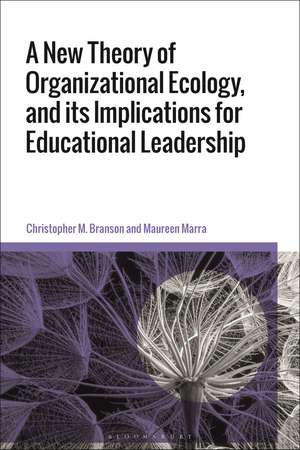A New Theory of Organizational Ecology, and its Implications for Educational Leadership
Autor Professor Christopher M. Branson, Dr Maureen Marraen Limba Engleză Paperback – 17 mai 2023
| Toate formatele și edițiile | Preț | Express |
|---|---|---|
| Paperback (1) | 190.87 lei 6-8 săpt. | +70.26 lei 7-13 zile |
| Bloomsbury Publishing – 17 mai 2023 | 190.87 lei 6-8 săpt. | +70.26 lei 7-13 zile |
| Hardback (1) | 597.78 lei 6-8 săpt. | |
| Bloomsbury Publishing – 20 oct 2021 | 597.78 lei 6-8 săpt. |
Preț: 190.87 lei
Preț vechi: 249.11 lei
-23% Nou
Puncte Express: 286
Preț estimativ în valută:
36.52€ • 39.80$ • 30.78£
36.52€ • 39.80$ • 30.78£
Carte tipărită la comandă
Livrare economică 23 aprilie-07 mai
Livrare express 19-25 martie pentru 80.25 lei
Preluare comenzi: 021 569.72.76
Specificații
ISBN-13: 9781350215153
ISBN-10: 1350215155
Pagini: 216
Ilustrații: 15 bw illus
Dimensiuni: 156 x 234 x 25 mm
Greutate: 0.31 kg
Editura: Bloomsbury Publishing
Colecția Bloomsbury Academic
Locul publicării:London, United Kingdom
ISBN-10: 1350215155
Pagini: 216
Ilustrații: 15 bw illus
Dimensiuni: 156 x 234 x 25 mm
Greutate: 0.31 kg
Editura: Bloomsbury Publishing
Colecția Bloomsbury Academic
Locul publicării:London, United Kingdom
Caracteristici
Provides a more holistic understanding of an organisation as an ecosystem and why it has important relevance for education and corporate institutions
Notă biografică
Christopher M. Branson is Professor of Educational Leadership and Director of Catholic Leadership Studies in the Faculty of Education and Arts at the Australian Catholic University, Australia. Maureen Marra is Director of the inLeadership consultancy based in Waikato, New Zealand.
Cuprins
List of IllustrationsIntroduction: The Organization as an Ecosystem1. Leading the Whole2. Reconstructing Culture3. Organizational Energy4. Organizational Synergy5. Creativity and Innovation6. Simplifying Complexity7. Leadership WisdomConclusion: Applications and ImplicationsReferencesIndex
Recenzii
This book offers more than a new perspective, it provocatively presents new theory, premised on the recognition that people make organisations. Incorporating conceptualisations of CAS, it challenges seminal and contemporary work before focusing on implications for education and its leadership. Each chapter includes an abstract and conclusion, clearly signalling the connectivity between the main themes.
